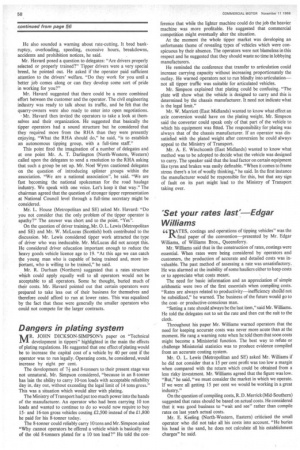"Set your rates last" Edgar Williams
Page 60

If you've noticed an error in this article please click here to report it so we can fix it.
46 DATES, costings and operations of tipping vehicles" was the -1-11final paper of the convention—presented by Mr. Edgar Williams, of Williams Bros., Queensferry.
Mr. Williams said that in the construction of rates, castings were essential. When rates were being considered by operators and customers, the production of accurate and detailed costs was invaluable. The past method of assessing a rate was unsatisfactory. He was alarmed at the inability of some hauliers either to keep costs or to appreciate what costs meant.
The need for basic information and an appreciation of simple arithmetic were two of the first essentials when compiling costs. "Rates are always related to productivity—inefficiency shoal not be subsidized," he warned. The business of the future would go to the costor productive-conscious man.
"Setting a rate should always be the last item," said Mr. Williams. He told the delegates not to set the rate and then cut the suit to the cloth.
Throughout his paper Mr. Williams warned operators that the need for keeping accurate costs was never more acute than at the moment. He rang a warning note when he told them that soon costs might become a Ministerial function. The best way to refute or challenge Ministerial statistics was to produce evidence compiled from an accurate costing system.
Mr. 0. L. Lewis (Metropolitan and SE) asked Mr. Williams if he did not consider that a 15 per cent profit was too low a margin when compared with the return which could be obtained from a less risky investment. Mr. Williams agreed that the figure was low. "But," he said, "we must consider the market in which we operate. If we were all getting 15 per cent we would be working in a great industry." On the question of compiling costs, R. D. Merrick (Mid-Southern) suggested that rates should be based on actual costs. He considered that it was good business to "wait and see" rather than compile rates on last year actual costs.
Mr. E. Keeling (North-Western, Eastern) criticised the small operator who did not take all his costs into account. "He buries his head in the sand, he does not calculate all his establishment charges" he said.
































































































































